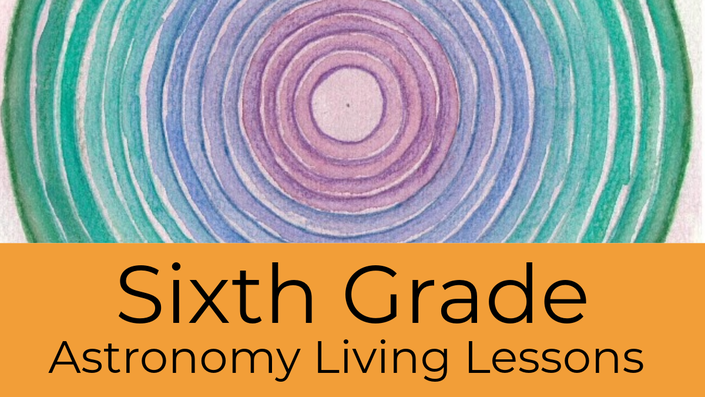
Waldorf Block: G6: Sixth Grade Astronomy
Explore the topics in the listing below during this block!
Living Lessons are video lessons where a teacher leads the class through the main lessons for this grade. You can use these lessons as examples to follow for your own teaching or can use them as supplements to your own teaching (we all need a break now and then. I would have loved to have these available on days I was ill or was taking care of my fussy baby). Scroll down to the class listings below to see the full syllabus and to view some free samples!
6th Grade Astronomy Block Lesson #1: Intro to The Horizon and Ecliptic
6th Grade Astronomy Block Lesson #2: The Movement of the Sun During the Year
6th Grade Astronomy Block Lesson #3: How the Calendar Year Arose
6th Grade Astronomy Block Lesson #4: Shadow Clocks
6th Grade Astronomy Block Lesson #5: Stars that Move, The Star that Doesn’t
6th Grade Astronomy Block Lesson #6: Is the Earth Round or Flat?
6th Grade Astronomy Block Lesson #7: Polynesian Ways of Navigation
6th Grade Astronomy Block Lesson #8: Using Longitude and Latitude
6th Grade Astronomy Block Lesson #9: Wandering Stars and Fixed Stars
6th Grade Astronomy Block Lesson #10: How the Stars and Moon Move Across the Sky
6th Grade Astronomy Block Lesson #10B: Painting of the Earth and Moon from Space
6th Grade Astronomy Block Lesson #11: The Precession of the Equinoxes
6th Grade Astronomy Block Lesson #12: The Great Mystery of the Platonic Year
6th Grade Astronomy Block Lesson #13: The Relationship of the Planets to Each Other
Writing for Lesson 13
6th Grade Astronomy Block Lesson #13B: Drawing the Pentagram of Venus
6th Grade Astronomy Block Lesson #14: The Moon
6th Grade Astronomy Block Lesson #15: The Tides and Other Moon Related Phenomena
6th Grade Astronomy Block Lesson #16: The Contributions of Pythagoras
6th Grade Astronomy Block Lesson #17 – Ptolemy’s Geocentric Model
6th Grade Astronomy Block Lesson #18 – The Heliocentric Model of Copernicus
6th Grade Astronomy Block Lesson #19 – The Eccentric Model of Tycho Brache
6th Grade Astronomy Block Lesson #20 – Johannes Kepler’s Correction of Copernicus
Do you want a FULL Waldorf Curriculum with Music, Handwork, Eurythmy, and extra Art Lessons?
Visit our sixth-grade Bundle HERE
Your Instructor

Nicholas Andrea now resides in the lush woodlands of northern Delaware with his family after spending the last six years teaching at the Asheville Waldorf School in North Carolina as a grades, music, and aftercare teacher. Nicholas earned his Waldorf Elementary and Music certifications at Sunbridge Institute in Spring Valley, NY. He is passionate about the Waldorf curriculum and believes in its ability to raise capable, compassionate, and creative human beings. After the birth of their son last October, Nicholas and his partner Cassie wanted more time at home with their baby which has led Nicholas to finding Earthschooling.
Nicholas is also passionate about music, speech arts, and history. Known in other circles as “The Bard,” Nicholas’s lifelong love of music has led him to a variety of instruments including world percussion, dijeridoo, flutes of various kinds, and Irish and Scottish bagpipes. He is also a published poet, and he spends his spare time plumbing the mysteries of world history in order to understand how we got where we are and where we go from here.
Course Curriculum
-
Start6th Grade Astronomy Block Lesson #1: Intro to The Horizon and Ecliptic (45:00)
-
Start6th Grade Astronomy Block Lesson #2: The Movement of the Sun During the Year (47:33)
-
Start6th Grade Astronomy Block Lesson #3: How the Calendar Year Arose (45:49)
-
Start6th Grade Astronomy Block Lesson #4: Shadow Clocks (57:50)
-
Start6th Grade Astronomy Block Lesson #5: Stars that Move, The Star that Doesn’t (44:54)
-
Start6th Grade Astronomy Block Lesson #6: Is the Earth Round or Flat? (41:20)
-
Start6th Grade Astronomy Block Lesson #7: Polynesian Ways of Navigation (47:34)
-
Start6th Grade Astronomy Block Lesson #8: Using Longitude and Latitude (57:23)
-
Start6th Grade Astronomy Block Lesson #9: Wandering Stars and Fixed Stars (57:02)
-
Start6th Grade Astronomy Block Lesson #10: How the Stars and Moon Move Across the Sky (98:30)
-
Start6th Grade Astronomy Block Lesson #11: The Precession of the Equinoxes (50:48)
-
Start6th Grade Astronomy Block Lesson #12: The Great Mystery of the Platonic Year (48:10)
-
Start6th Grade Astronomy Block Lesson #13: The Relationship of the Planets to Each Other (96:16)
-
Start6th Grade Astronomy Block Lesson #14: The Moon (55:51)
-
Start6th Grade Astronomy Block Lesson #15: The Tides and Other Moon Related Phenomena (51:59)
-
Start6th Grade Astronomy Block Lesson #16: The Contributions of Pythagoras (58:47)
-
Start6th Grade Astronomy Block Lesson #17: Ptolemy's Geocentric Model (53:04)
-
Start6th Grade Astronomy Block Lesson #18: The Heliocentric Model of Copernicus (39:21)
-
Start6th Grade Astronomy Block Lesson #19: The Eccentric Model of Tycho Brache (48:36)
-
Start6th Grade Astronomy Block Lesson #20: Johannes Kepler's Correction of Copernicus (43:17)
-
Start6th Grade Astronomy Block Lesson #21: Galileo and His Telescope (55:18)
-
Start6th Grade Astronomy Block Lesson #22: Block Review and Quiz (58:30)
-
StartTHIS BLOCK IS NOW COMPLETE